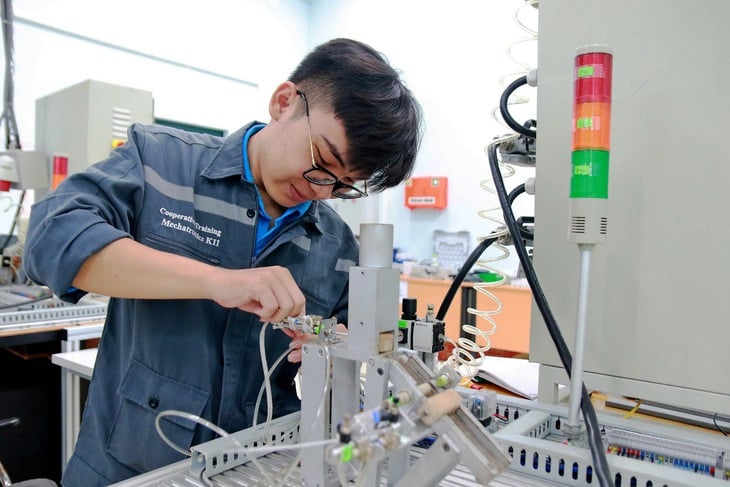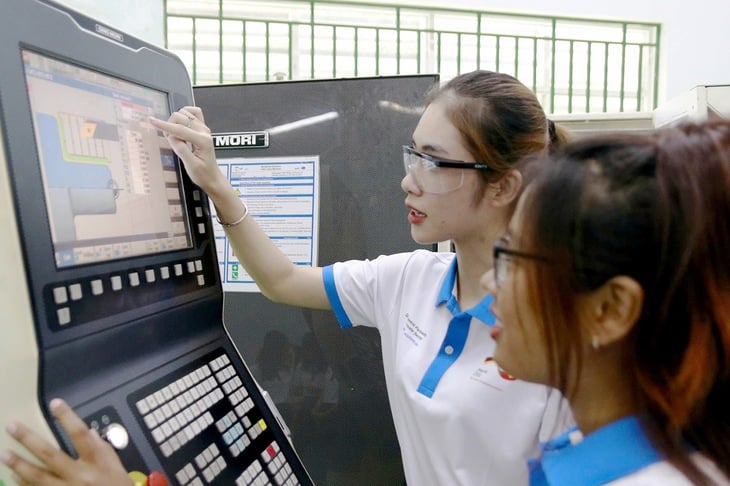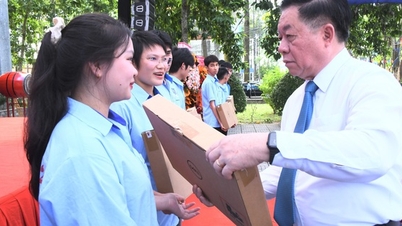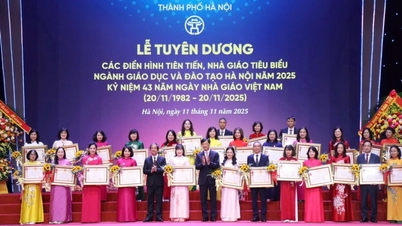
Students practice at Lilama 2 International Technology College - Photo: TRONG NHAN
These are the shares of Master Nguyen Khanh Cuong, Principal of Lilama 2 International Technology College, revolving around the needs, opportunities and challenges for colleges in particular and the vocational education system in general to meet the current demand for highly skilled labor.
Growing demand
* How do you evaluate the current demand for high-quality human resources in businesses?
- Currently, I see that the demand for high-quality technical human resources of enterprises is very large and increasing rapidly.
Not only foreign enterprises investing in Vietnam such as Germany, Japan, and Korea, but also domestic enterprises are showing a strong trend in recruiting highly skilled workers.
As production and international trade expand, machinery and technology are constantly improved, businesses are forced to modernize to increase productivity and product quality.
This has led to a great demand for qualified technicians who are capable of operating, maintaining and mastering modern systems. Previously, many factories needed a large number of unskilled workers, but now they want to gradually increase the proportion of highly qualified workers who can gradually replace simple labor positions.
* According to your observation, in what specific aspects do businesses need highly skilled workers or workers who can meet international standards, sir?
- I can temporarily divide the requirements into four major groups. The first is international standard skills and professional qualifications.
This means that learners must understand standard operating procedures, measure accurately, know how to use tools and equipment according to technical instructions, and know how to handle errors that arise during operation.
Some mechatronics, industrial electricity, welding, automation... jobs also require working with equipment from Europe or Japan because businesses now import a wide variety of production lines. Second is foreign languages, especially specialized English.
I emphasize that knowing a few sentences is not enough. Graduates need to be able to read technical documents in English, understand operating instructions, safety standards, and even technical emails from the company.
Third is industrial style. Enterprises attach great importance to being on time for work, complying with labor safety regulations, working in shifts, following procedures, and reporting clearly. Working in a modern production environment cannot be done on impulse.
Therefore, professional attitude, teamwork, coordination with engineers and foreign experts... are all considered mandatory criteria.
Fourth is the ability to update technology and digital transformation. Machines now integrate a lot of software, sensors, and intelligent control systems. Technical workers must accept that every few years, equipment will change, and processes will change.
Businesses highly appreciate people who know how to learn new things, know how to use computers to connect devices, know how to look up technical instructions...
Many challenges but also many opportunities
* Given those requirements, how is the current training at Lilama 2, sir?
- We determined from the beginning that vocational training cannot stop at the level of "being able to do the job", but must aim at "being able to work in an international environment". Therefore, all training activities of Lilama 2 are linked to the groups of competencies that businesses need.
Regarding international standard vocational skills, the school has cooperated closely with German educational and vocational development organizations such as GIZ to transfer training programs, vocational assessment standards and teaching methods.
Many professions have curricula and practice models according to German standards, and students are instructed by both Vietnamese lecturers and international experts.
Regarding foreign languages, especially specialized English, the school includes technical courses in English in the main curriculum. Students learn how to read drawings, operating documents, and safety procedures in English. Regarding industrial style, all students must comply with safety discipline, working hours, and procedures during the course of study.
Regarding the ability to update technology and digital transformation, the school proactively brings digital content into each profession, from using design and simulation software to operating equipment with integrated IoT and production data management systems.
Over the past time, we have strongly connected with international organizations and domestic enterprises. In particular, enterprises are not only places for students to do internships, but also participate in giving opinions, building training programs, assessing skills, and even supporting capacity building for lecturers.
* According to you, what are the advantages and disadvantages of training highly skilled workers in colleges today?
- I think the current period is a very favorable time for vocational education. The Party and the State have very clear policies and guidelines to develop high-quality human resources, considering this as the foundation for the country's new economic development.
The first challenge is the issue of funding. High-quality vocational training requires huge investment, from purchasing modern machinery and equipment, building internationally standardized programs, to training teaching staff.
Another difficulty is the level of business participation. Although in recent years many businesses have proactively cooperated with schools, in general, many businesses still do not really see the long-term benefits of participating in vocational training.

Recommendations
* What recommendations do you have to improve the quality of vocational training?
- I would like to contribute the following recommendations: Firstly, the State should increase investment in good quality vocational training institutions, especially those identified as national or regional key schools.
These schools should be assigned the task of training high-quality human resources for an area with a high concentration of businesses, industrial parks, and export processing zones.
Second, there needs to be a more flexible financial support mechanism for learners. For example, preferential loan programs for students pursuing high-quality vocational training, because vocational training according to international standards means higher costs for study, practice, and materials than for regular programs.
Third, businesses need to clearly see the benefits of participating in training with schools. When they cooperate in training, practical guidance or program development, they themselves are creating human resources that are suitable for the culture, processes and technology of the business.
And finally, the school itself needs to be proactive. The school needs to be proactive, must seek partners, must demonstrate the quality of its training so that businesses can trust and cooperate.
I think "proactive connection" is the key: proactively raising program standards, proactively seeking international projects, proactively inviting businesses to participate in training and evaluation.
Seminar "High-quality vocational training - Breakthrough in human resources in the new period"
The draft document of the 14th Party Congress has a paragraph about vocational education as follows: "Develop a number of vocational education facilities, training sectors and occupations to reach levels equivalent to those of the region and the world ."
To clarify the above spirit, and at the same time contribute perspectives to assess the current situation, challenges and models of high-quality vocational training in Vietnam, Tuoi Tre newspaper organized a discussion with the theme "High-quality vocational training - Breakthrough in human resources in the new period" on November 11 in Ho Chi Minh City.
The seminar will have the participation of state management agencies and representatives of colleges and businesses.
Experts will also propose mechanisms, policies, cooperation and regional linkages to develop highly skilled technical human resources. The seminar is accompanied by Lilama 2 College, Industrial College II and Kim Oanh Real Estate Group.
Source: https://tuoitre.vn/dao-tao-lao-dong-tay-nghe-cao-tien-quyet-o-su-chu-dong-2025110909345799.htm







![[Photo] Chu Noodles - the essence of rice and sunshine](https://vphoto.vietnam.vn/thumb/1200x675/vietnam/resource/IMAGE/2025/11/11/1762846220477_ndo_tl_7-jpg.webp)
![[Photo] Prime Minister Pham Minh Chinh chairs a meeting on housing policy and the real estate market.](https://vphoto.vietnam.vn/thumb/1200x675/vietnam/resource/IMAGE/2025/11/11/1762838719858_dsc-2107-jpg.webp)





















































































![Dong Nai OCOP transformation: [Article 4] Reaching national standard products](https://vphoto.vietnam.vn/thumb/402x226/vietnam/resource/IMAGE/2025/11/11/1762825820379_4702-cac-san-pham-trai-cay-chung-nhan-ocop-nongnghiep-174649.jpeg)



![Dong Nai OCOP transition: [Article 3] Linking tourism with OCOP product consumption](https://vphoto.vietnam.vn/thumb/402x226/vietnam/resource/IMAGE/2025/11/10/1762739199309_1324-2740-7_n-162543_981.jpeg)






Comment (0)